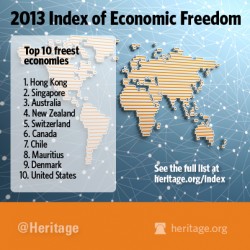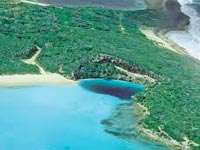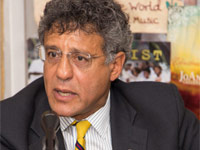 Bahamas ranks 39th out of 152 nations and territories included in the Economic Freedom of the World: 2013 Annual Report, released today by The Nassau Institute.
Bahamas ranks 39th out of 152 nations and territories included in the Economic Freedom of the World: 2013 Annual Report, released today by The Nassau Institute.
Hong Kong again topped the rankings of 151 countries and territories, followed by Singapore, New Zealand, and Switzerland. Globally, the average economic freedom score rose slightly to 6.87 out of 10 compared to 6.74 last year.
The United States, once considered a bastion of economic freedom, now ranks 17th in the world. Due to overspending, weakening rule of law, and increasing regulations on the part of the U.S. government, the United States has seen its economic freedom score plummet in recent years, compared to 2000 when it ranked second globally.
Venezuela has the lowest level of economic freedom worldwide, with Myanmar, Republic of Congo, Zimbabwe, and Chad rounding out the bottom five countries. Some nations, like North Korea and Cuba, could not be ranked because of a lack of data.
Research shows that people living in countries with high levels of economic freedom enjoy greater prosperity, more political and civil liberties, and longer life spans. The cornerstones of economic freedom are personal choice, voluntary exchange, freedom to compete, and security of private property.
“The link between economic freedom and prosperity is undeniable: the nations with the most economic freedom also offer people the best quality of life. Compare the bottom-ranked countries, where oppressive regimes deny their citizens opportunities for economic growth and personal freedom,” said Fred McMahon, Dr. Michael A. Walker Research Chair in Economic Freedom with the Fraser Institute.
The annual Economic Freedom of the World report is produced by the Fraser Institute, a Canadian think-tank, in cooperation with the Economic Freedom Network, a group of independent research and educational institutes in nearly 90 nations and territories worldwide. It is the world’s premier measurement of economic freedom, using 42 distinct variables to create an index ranking countries around the world based on policies that encourage economic freedom. Economic freedom is measured in five different areas: (1) size of government, (2) legal structure and security of property rights, (3) access to sound money, (4) freedom to trade internationally, and (5) regulation of credit, labor, and business. The full report is available at www.freetheworld.com.
Bahamas scores in key components of economic freedom (from 1 to 10 where a higher value indicates a higher level of economic freedom):
- Size of government: unchanged at 8.2 from last year’s report
- Legal system and property rights: unchanged at 6.6 from last year’s report
- Access to sound money: lowered to 7.1 from 7.21
- Freedom to trade internationally: changed to 6.3 from 5.95
- Regulation of credit, labour and business: unchanged at 8.8
The last two reports show little change in the overall index, but as many countries are becoming less free, now Bahamas ranks in the top quartile of countries in terms of economic freedom. However, the overall index is an average of very different situations. Although Bahamas ranks very well in terms of size of government and regulation, it ranks very poorly in terms of sound money and freedom to trade and ranks consistently with its overall ranking, 40, in terms of legal system and property rights.
International Rankings
Hong Kong has the highest level of economic freedom worldwide, with a score of 8.97 out of 10, followed by Singapore (8.73), New Zealand (8.49), Switzerland (8.30), United Arab Emirates (8.07), Mauritius (8.01), Finland (7.98), Bahrain and Canada (each 7.93), and Australia (7.88).
The rankings of other large economies include: United States (17th), Germany (19th), Japan and South Korea (tied at 33rd), France (40th), Italy (83rd), Mexico (94th), Russia (101st), Brazil (102nd), India (111th), and China (123rd).
The report notes that among the highest-ranked countries, the average income of the poorest 10 per cent of people was $10,556 (US) in 2011, compared to only $932 (US) for those living in the least free economies. On average, the poorest 10 per cent of people in the freest nations are more than twice as prosperous as the average population of the countries with the least economic freedom.
About the Economic Freedom Index
Economic Freedom of the World measures the degree to which the policies and institutions of countries support economic freedom. The 2013 report was prepared by James Gwartney, Florida State University; Robert A. Lawson, Southern Methodist University; and Joshua Hall, West Virginia University.
This year’s publication ranks 151 nations representing more than 95 per cent of the world’s population for 2011, the most recent year for which data is available. The report also updates data in earlier reports in instances where data have been revised.
For more information on the Economic Freedom Network, datasets, and previous Economic Freedom of the World reports, visit www.freetheworld.com. Also ‘Like’ the Economic Freedom Network on Facebook:
www.facebook.com/EconomicFreedomNetwork.
CONTACTS:
The Nassau Institute
Office and Milton Friedman Room
The Nassau Business Centre
Bay & Deveaux Streets
Nassau, N.P., The Bahamas.
Telephone: (242)302-0130 – extension 2226
For more information on the Economic Freedom Network, datasets, and previous Economic Freedom of the World reports, go to www.freetheworld.com.
The Nassau Institute is an independent, a-political, non-profit institute that promotes economic growth in a free market economy with limited government, in a society that embraces the rule of law and the right to private property.



